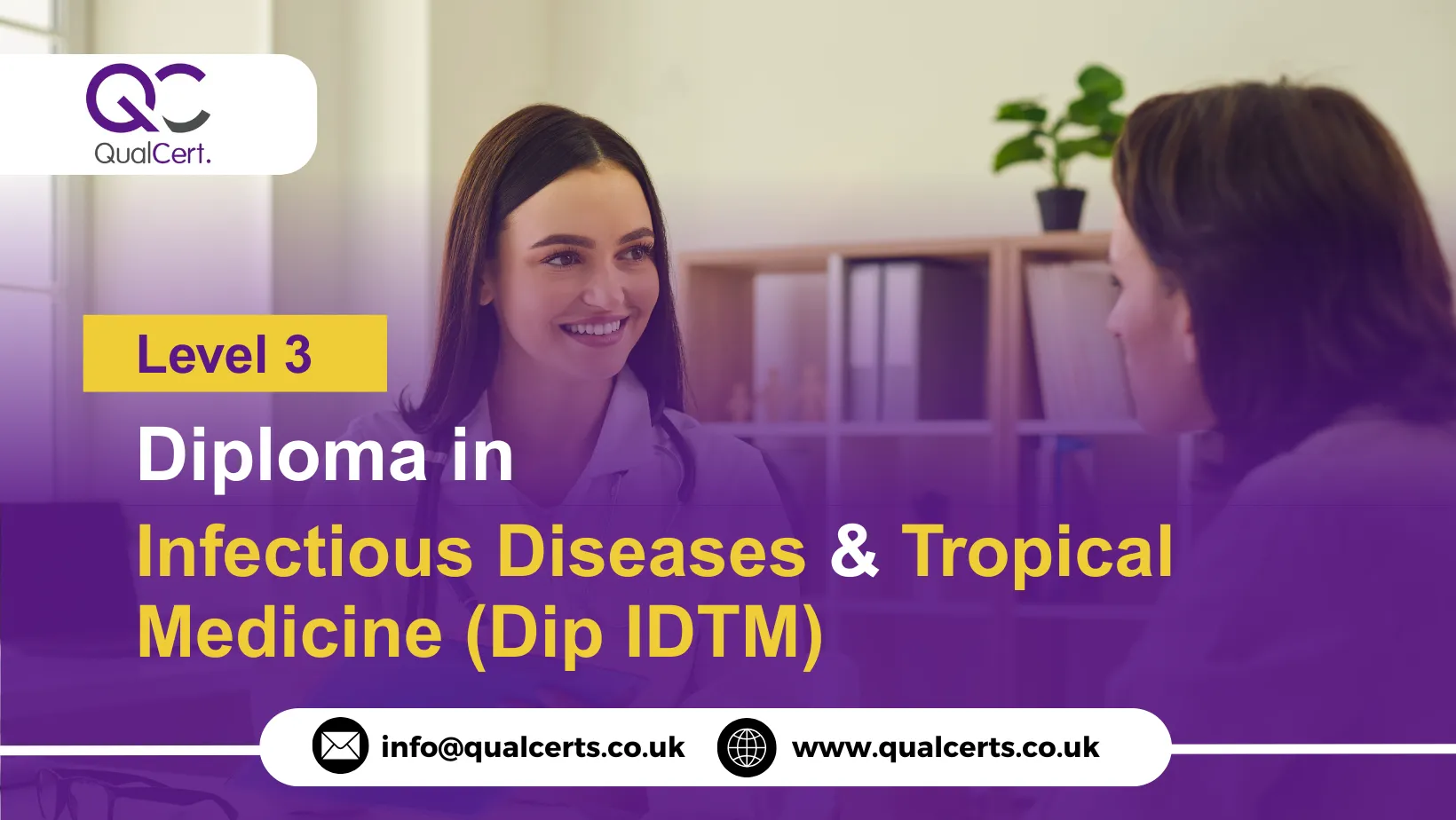The QualCert Level 3 Diploma in Infectious Diseases and Tropical Medicine (Dip IDTM) is a specialised qualification designed for healthcare professionals seeking advanced knowledge and practical skills in the prevention, diagnosis, and management of infectious and tropical diseases. This diploma is recognised in the UK and internationally, providing learners with a strong foundation for working in clinical, laboratory, and public health settings.
The Dip IDTM offers comprehensive coverage of infectious diseases, epidemiology, and tropical medicine, addressing both common and rare conditions that affect global populations. Participants will gain in-depth understanding of microbial pathogens, transmission dynamics, and treatment strategies, as well as the principles of public health interventions.
The course combines theoretical learning with practical applications, ensuring learners develop essential skills in clinical assessment, laboratory techniques, and patient care. By integrating evidence-based approaches and real-world case studies, the programme prepares professionals to make informed decisions and deliver high-quality healthcare in diverse settings.
The QualCert Level 3 Diploma in Infectious Diseases and Tropical Medicine is a robust and internationally recognised qualification that equips healthcare professionals with the skills and knowledge required to tackle infectious diseases effectively. With a focus on practical application and evidence-based practice, this diploma represents a significant step forward for anyone aspiring to specialise in this critical area of medicine.
Course Contents of QualCert Level 3 Diploma in Infectious Diseases and Tropical Medicine (Dip IDTM):
The QualCert Level 3 Diploma in Infectious Diseases and Tropical Medicine (Dip IDTM), offers 60 Credits, requiring a Total Qualification Time (TQT) of 300 hours, including 210 Guided Learning Hours (GLH).
| Unit Ref# | Unit Title | Credit | GLH | TQT |
| QC27143-1 | Principles of Infectious Diseases | 10 | 35 | 50 |
| QC27143-2 | Tropical Medicine and Epidemiology | 10 | 35 | 50 |
| QC27143-3 | Clinical Assessment and Diagnostic Methods | 10 | 35 | 50 |
| QC27143-4 | Prevention, Treatment, and Infection Control | 10 | 35 | 50 |
| QC27143-5 | Global Health and Emerging Diseases | 10 | 35 | 50 |
| QC27143-6 | Research, Evidence-Based Practice, and Professional Skills | 10 | 35 | 50 |
Entry Requirements for the QualCert Level 3 Diploma in Infectious Diseases and Tropical Medicine (Dip IDTM):
To enrol on the QualCert Level 3 Diploma in Infectious Diseases and Tropical Medicine (Dip IDTM), learners must meet the following entry requirements:
Minimum Age
- Applicants must be at least 18 years old at the time of enrolment.
Educational Background
- A relevant healthcare, science, or medical qualification is required.
- Equivalent qualifications demonstrating foundational knowledge in biology, health sciences, or related fields may also be considered.
Experience
- Practical experience in healthcare, clinical, or laboratory settings is preferred but not mandatory.
- Individuals with limited experience should demonstrate strong motivation and an interest in infectious diseases and tropical medicine.
Language Proficiency
- Proficiency in English is required to a level sufficient for academic study and professional communication.
- Applicants may need to provide evidence of English language competence, such as IELTS or equivalent, if English is not their first language.
Learning Outcomes for the QualCert Level 3 Diploma in Infectious Diseases and Tropical Medicine (Dip IDTM):
Principles of Infectious Diseases
- Identify different types of pathogens including bacteria, viruses, fungi, and parasites
- Explain mechanisms of infection and transmission
- Recognise common clinical signs and symptoms of infectious diseases
- Analyse host-pathogen interactions and immune responses
Tropical Medicine and Epidemiology
- Describe major tropical diseases and their global distribution
- Interpret epidemiological data to monitor and track disease outbreaks
- Understand environmental and socio-economic factors affecting disease prevalence
- Evaluate strategies for disease prevention and control in tropical regions
Clinical Assessment and Diagnostic Methods
- Conduct effective patient assessments for suspected infectious diseases
- Apply diagnostic and laboratory techniques to identify pathogens
- Interpret clinical tests, imaging, and laboratory results accurately
- Make informed clinical decisions based on evidence and case studies
Prevention, Treatment, and Infection Control
- Implement evidence-based treatment plans for infectious and tropical diseases
- Understand and apply vaccination and immunisation strategies
- Apply infection control and hygiene measures in clinical and community settings
- Educate patients on disease prevention and health promotion
Global Health and Emerging Diseases
- Recognise emerging and re-emerging infectious diseases worldwide
- Understand international health regulations and global response strategies
- Assess the impact of travel, trade, and climate change on disease spread
- Evaluate public health policies and outbreak management measures
Research, Evidence-Based Practice, and Professional Skills
- Conduct research using validated methodologies and critical analysis
- Apply evidence-based practice in clinical decision-making
- Demonstrate professional, ethical, and patient-centred behaviour
- Develop communication, leadership, and teamwork skills in multidisciplinary settings
- Healthcare professionals seeking specialised knowledge in infectious diseases and tropical medicine
- Nurses, clinicians, laboratory technicians, and public health practitioners
- Individuals aiming to work in international healthcare, research, or non-governmental organisations (NGOs)
- Professionals interested in advancing their career in global health, epidemiology, or outbreak management
- Anyone seeking to enhance practical and theoretical understanding of infectious and tropical diseases
The Centre Requirements for QualCert Level 3 Diploma in Nephrology (Dip N):
- Centres must be accredited by QualCert or an equivalent recognised awarding organisation
- Must have qualified and experienced teaching staff with relevant healthcare or scientific expertise
- Adequate classroom facilities for theory-based learning
- Access to practical training resources, including laboratory equipment and infection control simulation tools
- Policies and procedures for learner support, assessment, and quality assurance in line with UK standards

